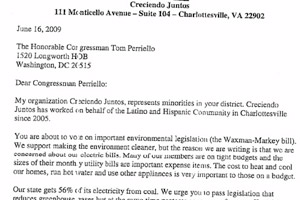The American Coalition for Clean Coal Electricity (ACCCE), the beleaguered coal lobby group, quietly lost a significant industry player last November, Mother Jones has learned.
Progress Energy, a North Carolina-based utility, decided late last year to not renew its membership in the multi-million dollar group that promotes so-called “clean coal,” a spokesman confirmed. The departure was not made public, but the group recently disappeared from the list of ACCCE members.
“We look at all of our memberships in these industry groups every year,” Drew Elliot, a Progress spokesperson, explains to Mother Jones. “We look at what we need to do and how that compares to frankly how much it costs to be in them.” Apparently, ACCCE no longer made the cut.
2009 was not a great PR year for ACCCE. It came to light that the group had paid a shady subcontractor to send forged letters to members of Congress lobbying against the cap and trade bill. Then, one of the organization’s vice presidents may have lied under oath about the group’s position on climate legislation. The group was also busted for misrepresenting a veterans group in an email. ACCCE came in at No. 3 on our Dirty Dozen of climate change denial in December, winning third place for its efforts to curry support for the as-yet non-existent technology of “clean coal” while their VP of communications refuses to say whether coal contributes to global warming.
There were several high-profile departures from ACCCE last fall over its discordant climate policy. Electric utility giant Duke Energy and Alstom, a French company that makes components for power plants, left in September.
Progress paid $1 million to ACCCE in 2008, putting the company among the group’s biggest contributors. But the company has been backing away from coal of late, announcing in December that they are shutting down 11 coal-fired power plants. Instead, they would move toward natural gas, a less greenhouse-gas intensive fuel source. A state paper hailed the move as evidence of “the beginning of the end of the era of cheap coal.”
Elliot noted that while coal remains about half of its energy mix, Progress sees natural gas as a bridge fuel to cleaner energy sources and has been moving its infrastructure in that direction. “We are taking steps to reduce our carbon emissions,” said Elliot. “Technological advances that can help us produce electricity cleaner and cheaper are going to be what our customers expect us to embrace.”














